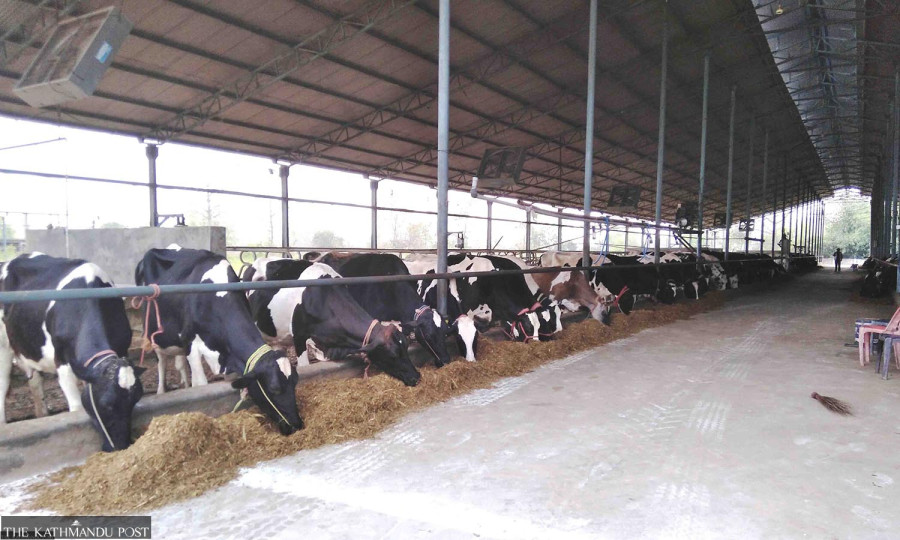Money
Israeli farm techniques add new twist to Kalash Dairy
The large-scale farm produces compressed natural gas and compost manure, besides producing dairy products.
Shankar Acharya
Software engineer Shyam Badan Yadav started Kalash Dairy one-and-half decades ago.
He started to source milk from farmers to produce dairy products such as ice cream, cake, curd, paneer, butter, and so on.
Yadav saw his business growing by leaps and bounds. However, he was unable to increase the output due to the lack of milk.
Three years ago, Yadav set up his own farm—Kalash Cattle Farm.
He now owns 150 cows of Holstein breed, and collects over a thousand litres of milk daily.
The milk produced by the farm is consumed by his factory alone.
The dairy products are sold to Birgunj, Janakpur, Lalbandi and Bardibas.
Along with the milk, his farm also produces a tonne of compressed natural gas (CNG) and a tonne of compost manure. The collected CNG is enough to power the factory for five hours a day. Whereas, the company sells manure commercially.
The production of gas will increase as more cows are added, which the company is planning to sell to in the industrial estate, stated Yadav.
Yadav aims to increase the number of cattle on his farm to 1,000 and milk production to around 25,000 litres a day in the near future.
“We are in the final stage of infrastructure development,” said Yadav. “We will increase the number of cows and milk production after a year.”
The total project cost is worth Rs770 million, out of which Rs500 million has already been invested. The remaining Rs270 million will be invested to buy additional 850 cows to operate at maximum capacity, he said.
The company is also producing silage–grass or other green fodder compacted and stored in airtight conditions, to use as animal feed in addition to the feed pallets.
According to Yadav, feeding the silage to the cows in addition to the regular feed increases milk production in cows.
Yadav claimed that the farm, spread over an area of around nine hectares, is the first fully automated cow farm in the country.
All tasks such as feeding the cows, extracting the milk, cleaning excreta are done by a computerised system, therefore a team of 17 people is enough to operate the entire farm, said Yadav.
The milking machine can milk a cow in five minutes and it has the capacity to milk 40 cows at a time.
Along with that, the company uses huge fans and water sprinklers to keep the temperature favourable inside the shade for the cows. Two veterinarians are appointed to the farm to take care of the cows and calves.
The cows and heifers are kept separately on the farm, likewise, milk-giving and non-milk-giving cows too are segregated.
Due to the cleanliness of the farm, the problem of odour and disease infestation is relatively low.
“We have a plan to set up a cattle feed manufacturing plant too,” added Yadav.
Yadav toured Israel to get training on dairy farming before setting up the farm. After returning, he obtained loans from Nabil Bank and Jyoti Bikash Bank and kicked off the project.
However, right after setting up the farm, the Covid-19 pandemic stalled his business. But now, it has picked up steam as people’s lifestyle has been restored to normalcy.
Once the company starts operating at full capacity, the farm will employ an additional 23 people, said Yadav.
The company is encouraging locals of Thori Municipality and three other local bodies to engage in maize farming. The maize produced by them will be bought by the company to use as feed for the cows.
“The farmers of Thori, which earlier planted tobacco and other cash crops, have started planting maize from this year,” said Yadav. “This will increase their income by threefold as compared to the other crops.”
Yadav stated there is no alternative to large-scale automated dairy farms in Nepal to bridge the gap between the demand and supply of dairy products in the country.
According to The Commercial Livestock Survey 2021 made public by the Ministry of Agriculture and Livestock Development, 15,380 dairy cows produce a total of 45,803 tonnes of milk on average while 10,841 buffaloes give 23,231 tonnes of milk on average.
Out of these, there are around 6,809 Holstein cows that produce 25,110 tonnes of milk on average every year.
The survey also states that there is are a total of 6,486 commercial livestock farms in Nepal.
“If around 25 large-scale dairy farms are established in the country, then we can be self-reliant in dairy products,” added Yadav.




 13.12°C Kathmandu
13.12°C Kathmandu













